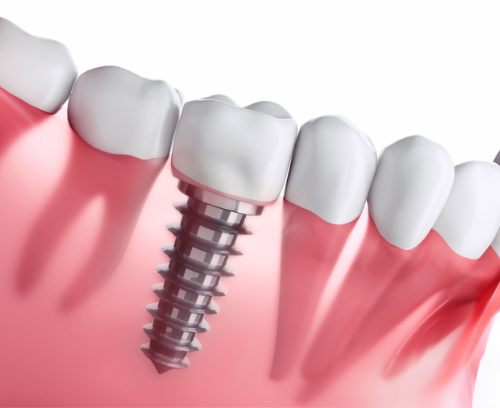What Can I Do About a Loose Dental Implant?
Posted by AllSmiles
My dentist placed three implants in January, and now one of them is loose. I am concerned about what went wrong and am losing trust in my dentist. What options might a dentist give me for fixing a loose dental implant? Thank you. Manal from Seattle
Manal,
Thank you for contacting our office. Although Dr. Michalski would need to examine your implant, we can explain factors that affect treatment for a lose implant.
What Can You Do About a Loose Dental Implant?
If your dental implant is loose, you should promptly contact your implant dentist, oral surgeon, or periodontist. Your doctor will examine the implant parts and gum tissue and take a 3-D CT scan of your bone to identify why your implant is loose. Your doctor will recommend treatment based on the cause of the loose implant.
Why Get Prompt Treatment for a Loose Implant?
You should get prompt treatment for a loose dental implant because it is a threat to your oral health. Without treatment, an infection can develop and worsen. If there is any chance of saving the implant, delaying treatment will result in dental implant failure. Implant parts include an artificial root, an abutment (connector), and a dental crown. Although dental implants have a 95 percent success rate, an untreated loose implant will fail.
What Causes a Loose Dental Implant?
Faulty implant parts, gum disease, implant location, failed osseointegration (fusion of the implant and bone), and other factors can contribute to a loose dental implant. But you will need an exam from your doctor to determine the culprit.
- Implant quality, type, or size – Faulty design of the artificial root or abutment or using the wrong implant type or size can weaken and loosen it.
- Implant location – If an implant is not in the optimal place, it can loosen.
- Insufficient torque – If your doctor does not sufficiently secure the implant in your bone, it can loosen.
- Lack of bone volume – Areas of low bone volume will not support an implant.
- Gum disease – Diseased gum tissue destroys bone tissue and leaves implants without support.
- Stress on the implant – Prematurely attaching replacement teeth to implants can loosen them. Also, failure to maintain a soft-food diet can disturb implant sites and cause looseness.
- Failed osseointegration – Implants will be unstable if the jawbone and implant do not fuse.
What Is the Treatment for a Loose Dental Implant?
 Treatment for a loose dental implant depends on the cause of looseness. Your doctor will examine the implant site and take a 3-D CT scan to examine your bone structure. Your treatment may include:
Treatment for a loose dental implant depends on the cause of looseness. Your doctor will examine the implant site and take a 3-D CT scan to examine your bone structure. Your treatment may include:
- Implant removal
- Gum disease treatment
- Bone graft
- Three to four months of healing
- Replacing the implant, possibly in a new position
- Alternative treatment
A skilled implant dentist can restore your oral health and help your dental implants succeed with proper planning.
Dr. Thaddeus Michalski, a Rocky Hill, Connecticut dentist and Diplomate of the International Congress of Oral Implantologist, sponsors this post.

